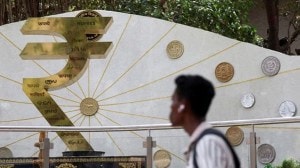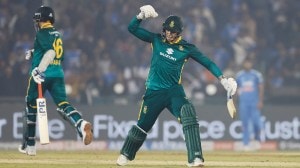We believe we are on the right track and victory will be ours
Swathed in a flowing black robe,69-year-old Dr Zahra Mostafavi beams with pride when she discusses her late father....
Swathed in a flowing black robe,69-year-old Dr Zahra Mostafavi beams with pride when she discusses her late father,Ayatollah Khomeini,the leader of Islamic Revolution in Iran.
In India for a lecture on Women and Isla,this PhD,the head of the philosophy department in Tehran,talks with child-like enthusiasm about the time her father spent with her and her four siblings,playing hide-and-seek virtually every afternoon,taking care to protect the younger children more,hiding them under covers.
As time passed on,they graduated to reading books together after he returned from exile,especially enjoying the works of a Turkish-Kurd author,Aziz Waisi. Mostafavi is on her second visit to India returning after 20 years and says she is seeing a tremendous change in the country. The amount of poverty one can see has come down drastically and the city looks much better, she says.
But time has moved on in her country too,30 years after the Shah was overthrown. What does she feel about the presidential election in Iran (where a four-cornered contest is expected to narrow down to one between incumbent President Ahmadinejad and reformist politician Mir-Hossein Moussavi)? Mostafavi says,Elections there are as they should be,nothing exceptional about them,there is competition between contenders to occupy the post which is nothing unusual.
On Obama ushering in optimism and hope,especially after his speech in Cairo,Mostafavi echoes her governments present hardline,perhaps going a step further. We are not interested in negotiations with the US. Obama has not made any radical change in (US) policies. We follow what we have to,and they do what they have to. We believe we are on the right track and victory will be ours. She adds,There are many contradictions in Obamas remarks.
For all her suspicions of the US,she rubbishes the Samuel Huntington idea of a Clash of Civilisations,saying,all talk of clashes has a motive behind it and that all individuals in the world are the same.
Mostafavi has spent a lot of time focusing on gender and Islam,and heads the Womens Society of the Islamic Republic of Iran. However,she is firm on matters that are often at the heart of the debate on gender in Islam. On a question of the right of Muslim women to not wear the hijab,as much as it is the right to wear one,Mostafavi sees no merit in any debate,saying,These are divine laws for men and women and should be observed. The hijab or covering of women immunises them from abuse and protects families. If men know there is no question of anything outside the family,they will be more loyal to their wives.
Mostafavi goes as far as to guess that divorce rates in the West are high given their propensity to dress in a particular way. While saying she is not sure of the exact statistics in the case of Iran,she is confident that appropriate clothes have preserved family life.
She is of the view that women must be allowed to pursue an appropriate role for themselves in politics,academics and education (where the Imam advocated the cause for women,she asserts) and like men,their talent must be allowed to flourish.
However,she is not in favour of forcing women to do 50-50 work,to be pushed into positions only to ensure parity,especially for women with families,what they do cannot be detrimental to their families.
Mostafavi,Imam Khomeinis youngest daughter,is a vocal defender of the regime and system founded in Iran after the overthrowing of the Shah. She is married and has two children a daughter who is a lawyer and a son who is a lecturer in a seminary. She has been active in pushing the Palestinian cause for the past ten years. Also,for the past decade,she has been the director general of the Society in Defence of the Palestinian Nation. At crucial moments,like at the time of the war in Lebanon in 2006,she praised the role of Hezbollah chief Hasan Nasrallah,when she wrote a much-publicised letter to him. The letter showered praise on Nasrallah and encouraged him to continue his struggle against Israel.
Mostafavi has seen and can recall Raj Kapoors films,but says she is unfamiliar with Shah Rukh Khan when asked about him. To keep herself engaged,she prefers to read Iranian works. She is deeply appreciative of Western philosophers including Descartes,Hegel and Bertrand Russell.
But three decades of the revolution in Iran have spawned a variety of responses from women from within,Nobel-laureate Shirin Ebadis pain at her life being snatched away once the revolution settled in Iran Awakening,or Marjane Satrapis graphic novel,Persepolis,which documents the darker side of life in Iran after the revolution,from a young girls point of view. Has she read either of the two works? Unfazed,Mostafavi shrugs her shoulders and says No,I havent followed or read them, which,she adds,does not mean they are not available in Iran.
- 01
- 02
- 03
- 04
- 05































